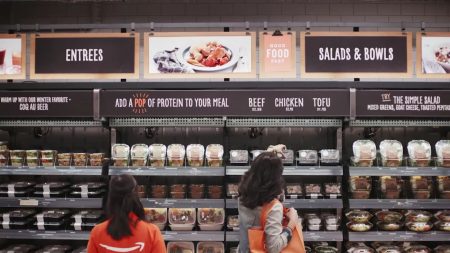April 10, 2017 – It has been awhile since I last shared the thoughts of Peter Diamandis of XPrize fame and Singularity University. It’s not that Peter has stopped writing. It’s the fact that his more recent email blasts have talked about content that one can find in his book “Bold: How to Go Big, Create Wealth and Impact the World” which, by the way, is now available as a 30-day free e-book download. And since I covered the content of this book in a previous posting I have chosen not to share these recent email blasts. But yesterday Peter decided to write about jobs vulnerable to AI and robotic advances. He talked about the jobs immediately most vulnerable, including truck drivers, retail and supermarket workers, and cashiers. And then he proceeded to focus on the latter rather than the former two. I found his speculations on the future very shareable and hope you find them as well.
When I’m shopping at Whole Foods or CVS, my goal is to get in and out of the store as soon as possible. Find what I need, pay for it and leave. As such, I imagine a near-term future in which an AI agent will guide me rapidly to the exact aisle and shelf to help me find the product. Then, as I leave the store, the system will charge me automatically. No need to stop, stand in line and pull out my wallet.
Taking it one step further, imagine a future where I never go to the store in the first place. My refrigerator can sense that I’m low on milk or eggs, order it all from the store, and have those products delivered by autonomous vehicle or drone. In this near-term scenario, all I do is take the products off my front doorstep and stock them in my refrigerator.
High-level autonomy is already underway. Over the last few months, up in Seattle, Amazon has established a store called Amazon Go, which is a cashierless retail store for Amazon employees only. The reason it’s only for Amazon employees is that they’re doing tests to see how it works. Currently, Amazon employees access an app, enter the store, and then simply take what they want off the shelf.

That’s it. A system of cameras and sensors can observe what you’re taking and how many, and Amazon charges the correct amount to your account. All you do is walk out, no checkout and no cashiers. The technology isn’t perfect yet, which is why Amazon is doing this as a test. But it will get better and will ultimately become how stores transact purchases.
Will some retail stores only employ humans? Skip the automation? It’s possible, but I doubt it.
Imagine comparing two stores: one that embraces the technology and another that does not. The store that’s fully autonomous enables you to walk in, get your products, and leave twice as fast. And, by the way, the products are cheaper because the business doesn’t have employee overheads. How will this compare to a retailer that offers slower and more expensive services? The store employing humans will be slower to respond to customers, more expensive, and will ultimately go out of business. The end result, the jobs will disappear.
For those who are cashiers, when will this happen? I would imagine it’s not in the next couple years, but likely within five, and definitely within the next decade.
Knowing that, how do you prepare yourself? Here’s my question: what did you want to do when you were younger? Did you always want to be a cashier, or did you want to be a nurse, teacher, or to travel the world? Ultimately, going back to your early passions and taking on the education needed to achieve them is what’s needed. Take caution, though, as even those jobs may become displaced by AI and robots eventually.
We’re heading into a period where technological employment will cause us to struggle with how we find meaning in our lives, and with how we earn our living. Important experiments are going on today with Universal Basic Income (UBI), a program to pay everyone a salary, whether working or not. UBI will ensure we have food on the table, medical care, and so on, but it’s not going to give meaning to our life. This is something we need to think about and solve, not in 20 years or 10, but in the next five.








